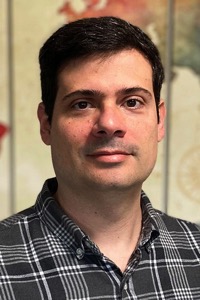The IEEE 802.11 Standard and Its Constant Evolution to Meet New Demands
This month we have invited Claudio da Silva from our Distinguished Lecture Series to provide two presentations on the evolution of IEEE 802.11 standards and unique applications. The student chapter at DU is hosting this event. Pizza and sodas will be served.
Guests can park along the streets nearby or in paid visitor’s parking.
Date and Time
Location
Hosts
Registration
-
 Add Event to Calendar
Add Event to Calendar
- University of Denver
- 2155 E Wesley Ave.
- Denver, Colorado
- United States 80208
- Building: Ritchie School of Engineering and Computer Science
- Room Number: ECS 410
Speakers
 Claudio da Silva of Meta Platforms
Claudio da Silva of Meta Platforms
The IEEE 802.11 standard and its constant evolution to meet new demands
The importance of technologies based on the IEEE 802.11 standard to our society cannot be overstated. For example, Wi-Fi, one of such technologies, has been the leading wireless connectivity technology used in homes and businesses around the world for more than two decades, and it is estimated to carry about 60% of the world’s mobile traffic today. As the use of wireless connectivity continues to increase and evolve, the IEEE 802.11 standard is constantly evolving to meet new demands, such as improved performance in dense environments and consistent ultra-low latency data transfer. In this talk, we will first overview the IEEE 802.11 Working Group and some of its current on-going efforts. We will then examine current work on future generations of the IEEE 802.11 standard, with emphasis on the main driving forces behind the standard evolution along with new features being considered.
Biography:
Dr. Claudio da Silva is a Wireless Systems Engineer in the Reality Labs group of Meta Platforms (formerly Facebook) and is responsible for the standardization of wireless connectivity technologies and for advancing Meta’s spectrum policy strategy. He also serves as the Technical Editor of IEEE 802.11bf (WLAN Sensing), a task group currently developing an IEEE 802.11 amendment that enhances Wi-Fi sensing technology, and as an IEEE ComSoc Distinguished Lecturer for the 2022-2023 term.
Before joining Meta Platforms, Dr. da Silva was with the Next Generation & Standards group of Intel Corporation, where he was responsible for driving technology and product innovation by leading and contributing to various standardization, certification, and regulatory activities. During his tenure at Intel, he served as the Technical Editor of Wi-Fi Alliance's 60 GHz TTG from 2019 to 2021. Before Intel, he worked on cellular modem implementation and applied research at Samsung Mobile Solutions Lab. The first years of his professional career were spent at Virginia Tech, where he was an Assistant Professor in the Bradley Department of Electrical and Computer Engineering.
Dr. da Silva received the B.S. and M.S. degrees from the State University of Campinas, Brazil, in 1999 and 2001, respectively, and the Ph.D. degree from the University of California, San Diego in 2005, all in electrical engineering. He was an Editor for Modulation and Signal Design for the IEEE Transactions on Communications from 2012 to 2015, and has served on the technical program committee of numerous IEEE conferences in the communications area. He is a Senior Member of the IEEE.
Email:
Address:Oregon, United States
Claudio da Silva
Introduction to Wi-Fi sensing and the IEEE 802.11bf standard
Wi-Fi sensing is the use of Wi-Fi to enable everyday electronic devices to acquire information and become aware of their surroundings. Interest and research in the area has grown steadily over the past two decades, and Wi-Fi sensing is now used in a wide range of applications, including user presence detection, space occupancy analytics, and home security systems. Due to the significant and growing market interest in the area, a new IEEE 802.11 Task Group (IEEE 802.11bf) was recently formed to develop an amendment to the 802.11 standard that will enhance its ability to support Wi-Fi sensing applications. This talk will begin with an introduction to wireless sensing systems and to Wi-Fi sensing. We will then discuss the main definitions and features of the IEEE 802.11bf draft standard.

